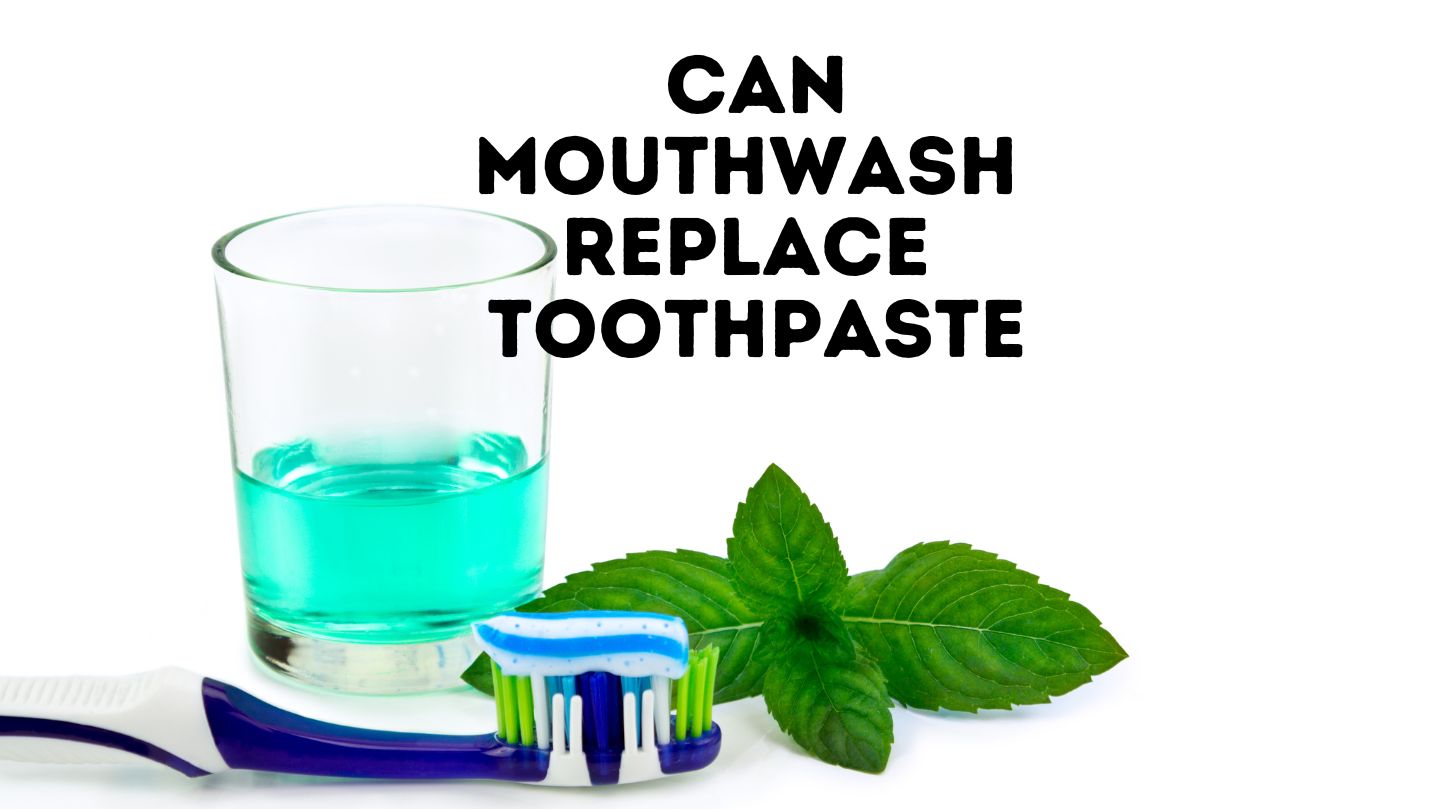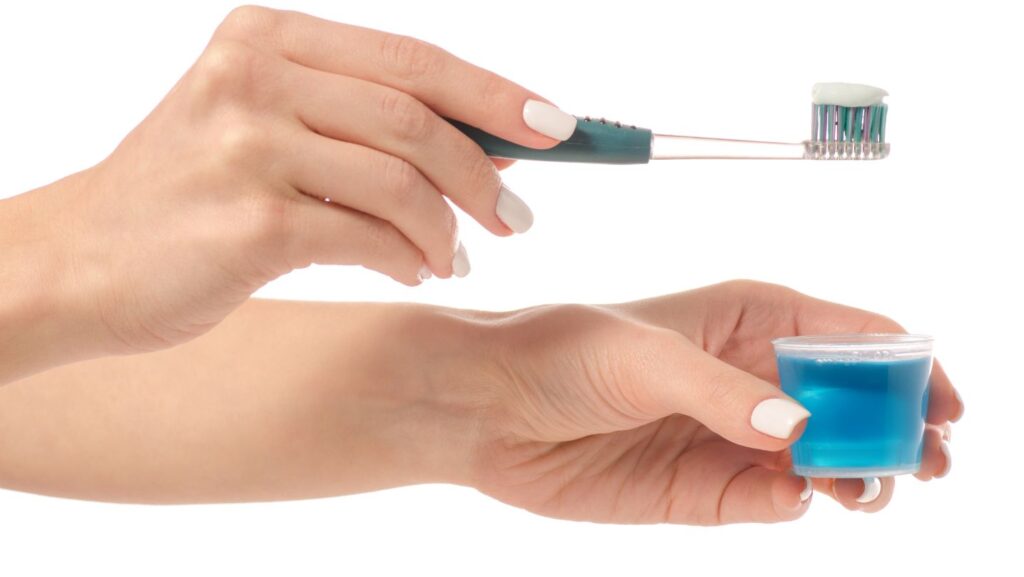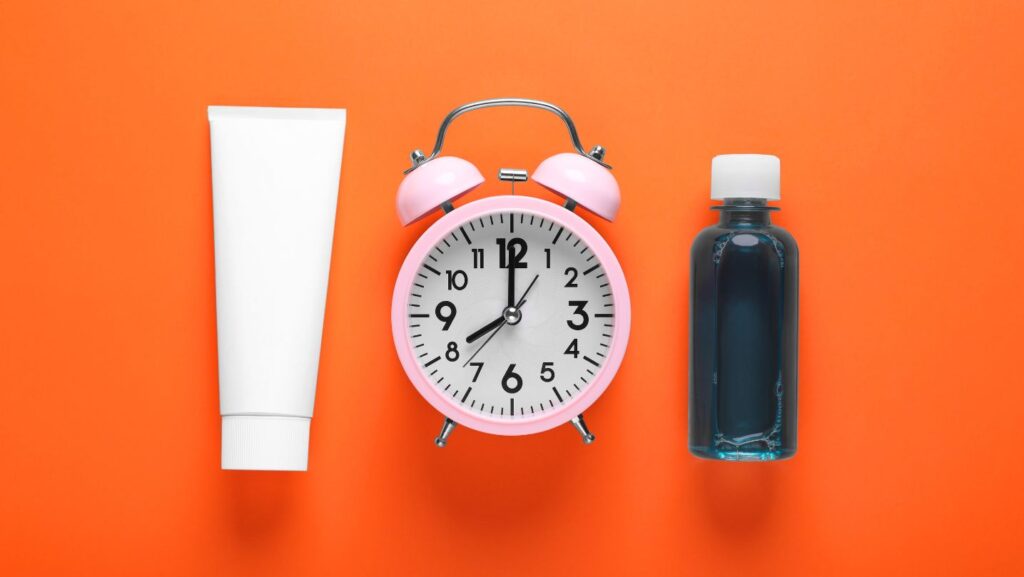
That refreshing sensation and minty-fresh breath after using Mouthwash might make you wonder if it can substitute Toothpaste in maintaining dental hygiene. While fluoride mouthwash can aid in cavity prevention, it falls short regarding plaque removal. Despite swishing Mouthwash vigorously, it simply cannot eliminate plaque from your teeth. The misconception that Mouthwash alone can replace brushing your teeth must be clarified.
Join us in this comprehensive guide as we explore Whether Mouthwash Can Replace Toothpaste or not? We will explore the truth about Mouthwash and its role in dental health. Let’s break down the myth surrounding Mouthwash’s effectiveness as a standard dental care solution. Ensure you stick to the end to get the most out of it.
Table of Contents
Can I Use Only Mouthwash Instead Of Brushing?
Mouthwash alone isn’t enough for dental care, and brushing is extremely important. Mouthwash can never replace Toothpaste. The primary role of Mouthwash is to reduce bacteria and freshen your breath temporarily. However, Mouthwash cannot effectively remove plaque and tartar buildup on your teeth. Using Mouthwash instead of Toothpaste can result in causing of tooth decay, gum disease, and other dental health problems.
For removing plaque and food particles effectively from teeth, the mechanical action of brushing with a toothbrush is compulsory. Brushing teeth can stimulate gums and reach areas where Mouthwash cannot. Also, ingredients like Fluoride in Toothpaste can fight tooth decay and strengthen tooth enamel.
Can Mouthwash Alone Remove Plaque And Surface Stains From Teeth?
No, Mouthwash isn’t formulated for removing plaque and surface stains from teeth as a standalone. Plaque is a layer of sticky film that settles on teeth. Plaque contains bacteria that can result in tooth decay and gum disease. If not removed regularly, Plaque can damage dental health. For removing plaque effectively, using a toothbrush with Toothpaste is mandatory. As the toothbrush bristles, along with Toothpaste, move over teeth, they physically scrub away plaque and food particles from the surfaces of your teeth.
Similarly, surface stains on teeth are caused by coffee, tea, or tobacco and require mechanical action by a toothbrush to be effectively removed. Brushing your teeth with stain-removal Toothpaste and regular dental cleanings can reduce surface stains. The natural whiteness of teeth might not be restored very quickly, but the stains disappear.
Therefore, Mouthwash alone cannot remove plaque and surface stains from teeth. Mouthwash is designed for additional oral care. However, it doesn’t deliver any primary dental and oral care benefits. Mouthwash should not be relied upon as the sole plaque or stain removal method. A routine of brushing, flossing, and professional dental cleanings is mandatory.

Is Mouthwash Doing More Harm Than Good?
Mouthwash offers a range of benefits when used as part of a comprehensive oral hygiene routine correctly. It can reduce bacteria in the mouth and help in freshening bad breath. Or, if the Mouthwash contains Fluoride, it can even strengthen tooth enamel and prevent cavities.
Although Mouthwash is a useful dental care product, it can do more harm than good in a few cases. For instance, Alcohol-based mouthwashes can result in dryness of the mouth. The alcohol content in Mouthwash can make individuals with sensitive oral tissues uncomfortable. Extended usage of alcohol-based Mouthwash can also lead to oral microbiome imbalance. Besides that, using Mouthwash excessively can be detrimental. Using Mouthwash instead of brushing and flossing isn’t good for dental health. As a standalone, Mouthwash can never remove plaque or replace the mechanical action benefit of brushing and flossing. Lastly, relying solely on Mouthwash for dental care may lead to the risk of cavities, gum disease, and other oral health problems.
In short, using the right Mouthwash in the right manner and quantity is important. Improper, irregular, or excessive use of Mouthwash can do more harm than good.
Reasons Not to Use ONLY Mouthwash Instead of Brushing Teeth
Mouthwash is an excellent addition to your oral care routine. However, one must never rely on Mouthwash as the sole method of cleaning your teeth.
Here’s why ONLY Mouthwash instead of Brushing teeth aren’t recommended:
- Since Mouthwash lacks the necessary mechanical action using it alone can result in ineffective plaque removal.
- Mouthwash is a liquid, but it is insufficient for reaching and cleaning hard-to-reach areas inside our mouths. Therefore, brushing teeth with a toothbrush is important to clean everything, including space between teeth, back molars, along the gumline, tongue, and more. Avoiding the use of proper brushing can result in the accumulation of plaque, tartar, and food debris in the mouth.
- Mouthwash alone cannot remove tartar or dental calculus. To remove this hardened plaque, you either do regular brushing followed by a professional cleaning at a dentist. Even for brushing, using a Tartar control toothpaste is recommended.
- Some Mouthwash may contain Fluoride, but they aren’t enough to replace fluoride toothpaste. The fluoride concentration in Mouthwash is typically lower than in Toothpaste; therefore, it isn’t enough as a standalone.
- Failing to brush your teeth regularly and using just a Mouthwash can increase the risk of cavities, gum disease, bad breath, etc.

Toothpaste and Mouthwash – Is One Kind Better Than Another?
Both Toothpaste and Mouthwash serve different purposes in oral care. While the debate for comparison often comes around, Toothpaste is always better than Mouthwash. For their role and effectiveness in dental and oral care, Toothpaste with toothbrushes has more benefits.
Functions and Benefits of Toothpaste:
- Toothpaste (when used with a toothbrush), with its mild abrasive properties, removes plaque and surface stains from teeth.
- All ADA-approved Fluoride containing toothpaste prevents tooth decay, strengthens tooth enamel, and reduces cavities.
- Flavoring ingredients like Mint, Clove, Cinamon, etc., in Toothpaste helps freshen breath.
- Toothpaste comes in various variants for addressing dental issues like tooth sensitivity, gum health, tartar buildup, whitening, etc.
Functions and Benefits of Mouthwash:
- Mouthwash freshens breath and reduces the odour-causing bacteria in the mouth.
- Some antiseptic mouthwash is known for temporarily reducing the bacterial load in the mouth.
- Mouthwashes enriched with fluoride aid in strengthening tooth enamel and preventing tooth decay.
- However, despite the different roles of Toothpaste and Mouthwash, dental care professionals recommend using both together to complement each other’s benefit.
Does Mouthwash After Brushing Wash Away Fluoride?
Yes, using Mouthwash right after brushing your teeth can remove the Fluoride from Toothpaste. If not washed away, the rinsing action generated by Mouthwash can dilute the fluoride concentration in the mouth. However, how much Fluoride can be washed away depends on a range of factors. The duration of swirling Mouthwash, the amount of Fluoride in Toothpaste, and the specific Mouthwash used are some factors that can be quoted as responsible.
While there aren’t many clinical studies but it is generally recommended to wait 15 to 20 minutes before using Mouthwash after brushing before. Especially if the Mouthwash is Fluoride free or/ and contains Alcohol, it is ideal for taking a gap.
Here are a few guidelines you can follow to maximize the benefits of Fluoride in your Toothpaste:
- After you brush your teeth with Fluoride toothpaste, do not rinse immediately. Instead, spit out the excess foam and allow the Fluoride residual to remain longer on your teeth. Giving it a 3 to 5-minute time frame before you rinse can increase its effectiveness in strengthening tooth enamel and preventing decay.
- If you use Mouthwash daily after brushing, consider waiting at least 15 to 20 minutes. This interval will let Fluoride from the Toothpaste fully absorb in your teeth and integrate with tooth enamel. This will keep it from potentially diluting with Mouthwash.
- If you use Mouthwash daily, consider using a fluoride mouthwash. Fluoride has immense benefits for dental and oral care; thus, incorporating a fluoride mouthwash will benefit.
Wrapping up…
Overall, Mouthwash can benefit oral health and hygiene, but it can never fully replace the use of Toothpaste and toothbrush.
A Fluoride Toothpaste and a toothbrush are important to remove plaque and bacteria from the teeth and gums. As the toothbrush bristles move over your teeth and around your mouth, they clean thoroughly. Mouthwash as a standalone cannot fulfill the role of a toothbrush and Toothpaste, nor can it substitute for the same.

Hi, This is Lyn, I suffer from dental sensitivity for a very long time. PowerToothpaste.com is where I share my views of various toothpaste brands, along with tips on how to use toothpaste and what to look for when purchasing.
